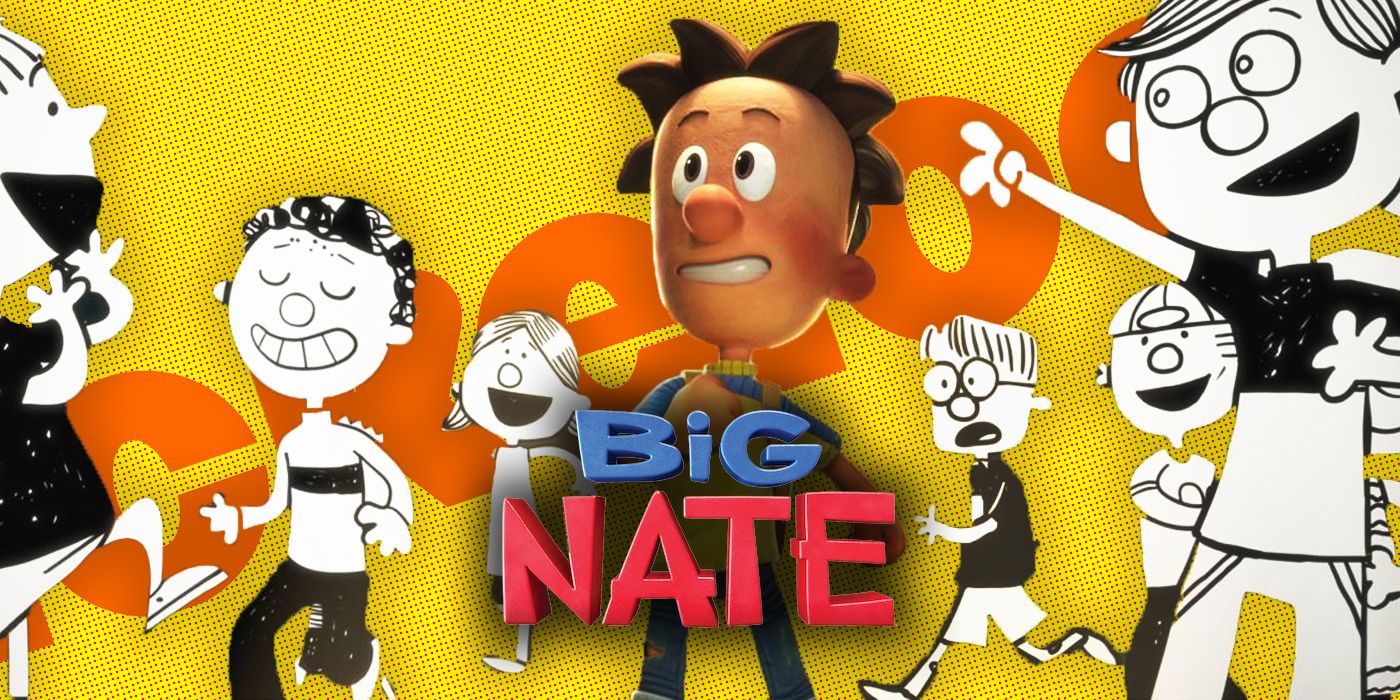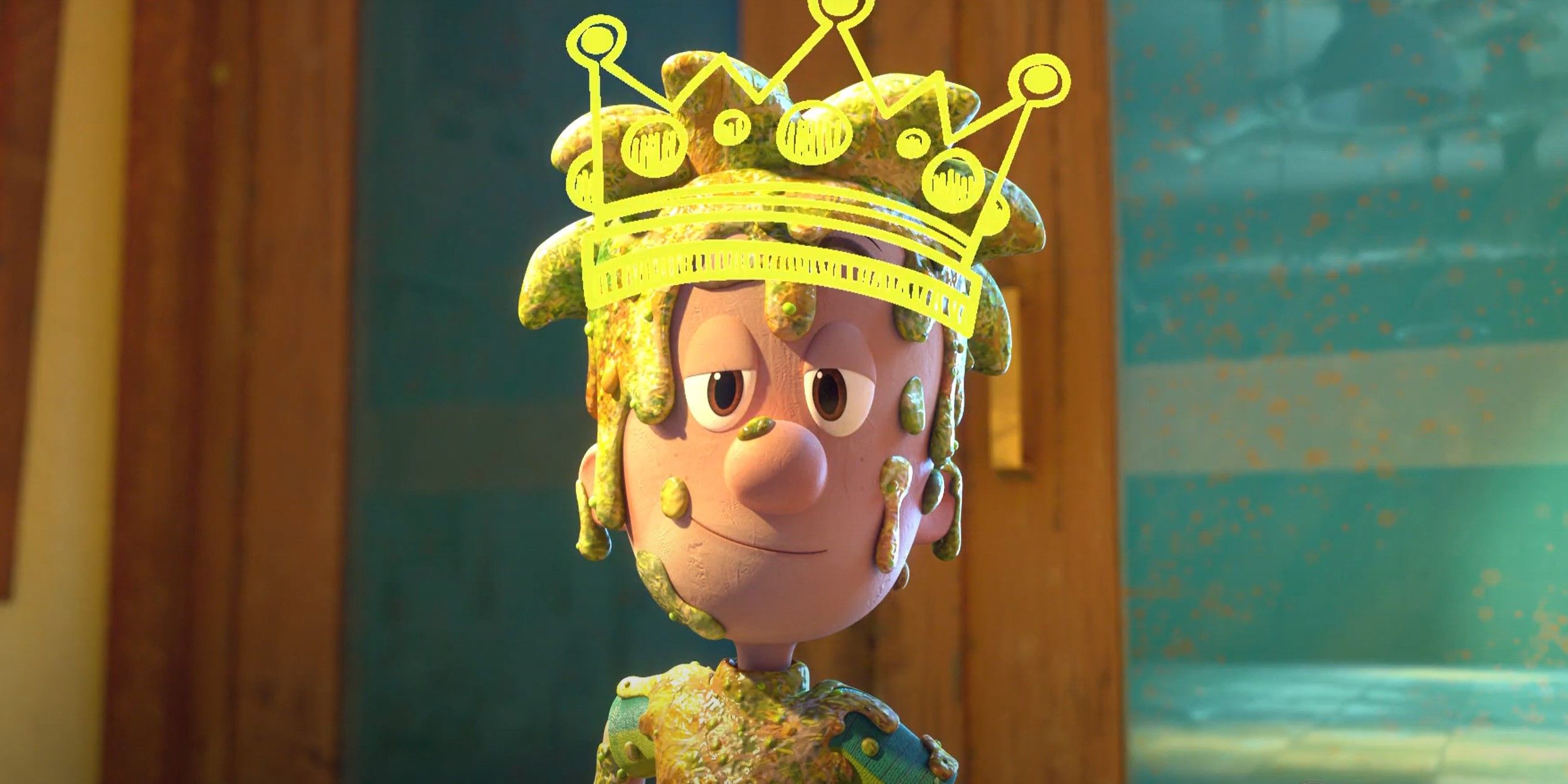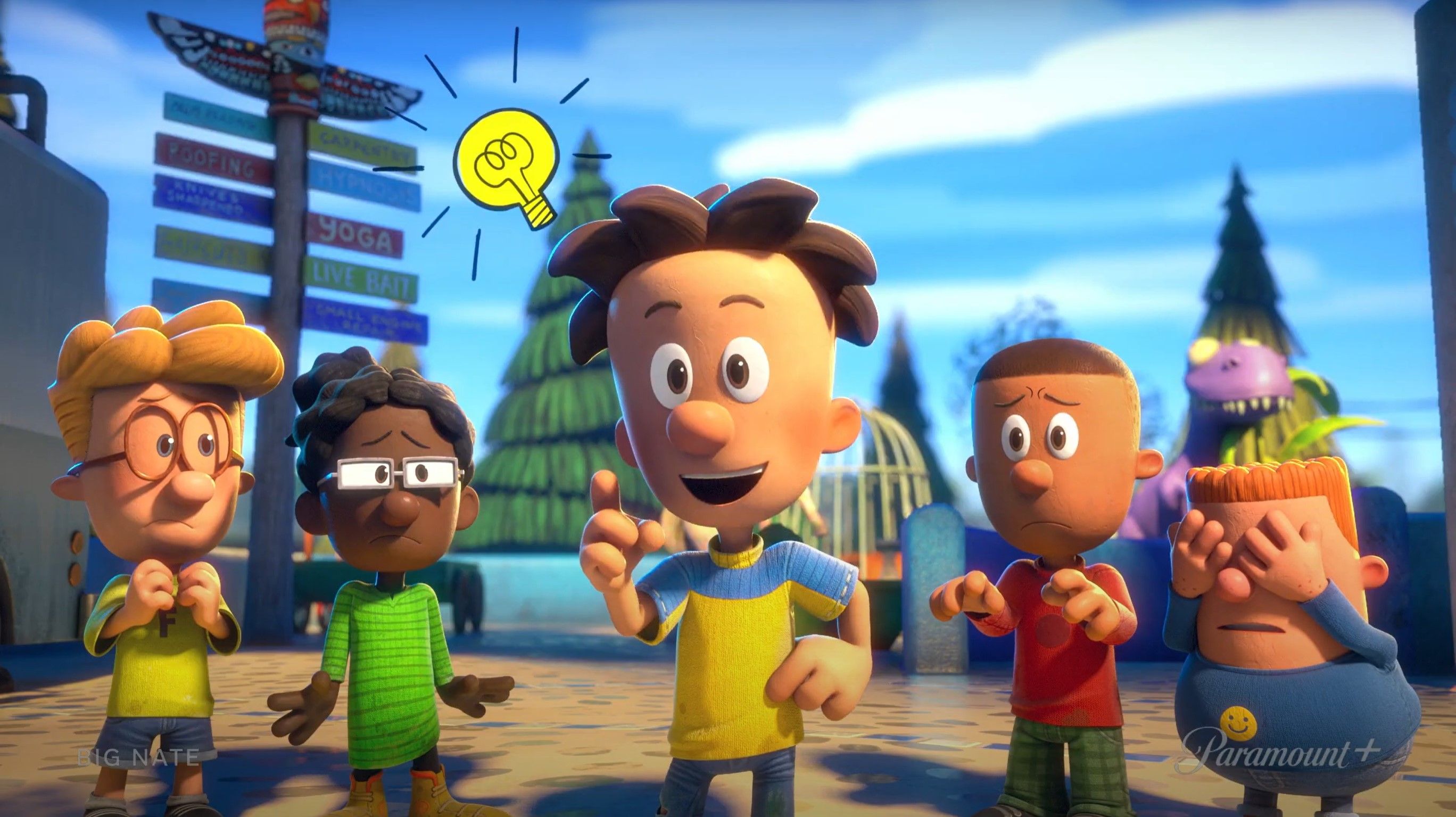The upcoming Paramount+ series Big Nate (adapted from the long-running comic and book franchise by author Lincoln Peirce) follows the antics and the misadventures of the titular protagonist Nate Wright (voiced by Ben Giroux), a mischievous and creative sixth-grader who would rather be hanging out with his friends, drawing cartoons, and playing drums instead of going to school (who can't relate, am I right?). He's also a notorious prankster who frequently ends up in the crosshairs of his social studies teacher Mrs. Godfrey (Carolyn Hennesy) for various shenanigans, and usually spends more than a little time in detention as a result. The show, which is executive produced by Mitch Watson and John Cohen, also stars the voices of Dove Cameron, Rob Delaney, Arnie Pantoja, Charlie Schlatter, Kevin Michael Richardson, Daniel MK Cohen, and Bryce Charles, and includes a special guest appearance from Jack Black. Collider is exclusively debuting the Big Nate theme song ahead of the show's February 17 premiere on Paramount+, and you can check it out in the player above.
Earlier this week, we also had the chance to briefly sit down with Watson and Cohen to discuss this adaptation's long road to release, what they decided to take from the original Big Nate stories for the TV series, and what type of sound they were always looking for with the theme song, as well as whether there were any other versions that existed before they settled on the finished product.
Collider: In terms of this show, and adapting these books that are so beloved, there's been a long road to this point. How did you both become involved with turning Big Nate into a show, and when did the pieces fall into place in terms of finally making this happen?
JOHN COHEN: Well, I'll jump in. I've been a huge fan of Lincoln Peirce's comic strip and his books for years and had reached out to him a while back. We always knew from the very beginning that Big Nate should be an animated series. That was very important. We also wanted to make sure that we found the right home and the right partners to do it.
What we found with some of the people that we talked to is that they could only envision it as live-action. They were very excited about it, but they said, "Well, it should be like Diary of a Wimpy Kid," which those movies were done in live-action. But we felt strongly that these are cartoon characters, like The Simpsons or Peanuts. And our characters don't age. Nate is always in sixth grade and they have designs in a cartoon physicality. So it was when we got together with the team at Nickelodeon, Ramsey Naito, Nathan Schram, Claudia Spinelli, and all the fantastic people over there who introduced us to Mitch, we knew that we had found the perfect collaborators and the right home to do it.
MITCH WATSON: And I got involved when, just like John was saying, Ramsey Naito, who runs Nickelodeon, I've known her for many, many, many years. She reached out to me because she thought that the character of Nate reminded her of me. So I said, "Okay." She introduced me to John, and John and I hit it off. I think then they introduced me to Lincoln and heard what Lincoln's intentions were and everything like that.
I think the big linchpin was the problem that people had had in the past with adapting this character was a lot of people read it on the surface as Nate's a jerk. Who wants to watch a show about a jerk? And I didn't read it that way. I read him basically as a slightly insecure kid who dreams of being something better than he is, and his way of achieving that is basically to be the class clown. He's pulling pranks and making his friends laugh and doing things and trying to achieve this level of awesomeness that's a fantasy in his head of where he needs to be. When we meet him in the pilot and then throughout the rest of series, he's not there yet, but he's moving in that direction. So that's really his arc for the series. Maybe it's because I identified with the character, and I was a bit like that in middle school that it made perfect sense to me. So when I chatted with Lincoln and John, and they heard my take on it, we just clicked.
Then it really became, how do we show that to an audience? In the pilot, that was achieved by creating the character of Bentley Carter, who is truly an awful person. So when you really see somebody who's truly awful against Nate, you realize, "Oh, Nate's not that bad. Nate's not even close to being that insane." So that allowed us to show Nate's more vulnerable sides. Then we created the character of Brad Gunter, who's played by Jack Black, who's Nate's weird spirit guy. Nate's sitting on the toilet, and he's talking to what may or may not be a fantasy about who he wants to be and how he didn't think it was going to be this hard, and his spirit guy basically tells him not to keep his head down and just go for it. I think any kid in that age range, or even above, even adults, you want to root for that kid. You want to root, regardless of the fact that he's a troublemaker. You want to root for a kid who dreams of being something better than who he is, and that was the key, that was the engine that we found and helped us do the series.
How many of the episodes are pulled from existing stories? Or did you want to use some of those familiar stories as a springboard to maybe introduce new things that fans don't know?
WATSON: Except for one episode that's down the line a little ways, we didn't really pull any of the episodes from the books. My goal, in adapting IP, is not so much to make a carbon copy of the books, but to somehow take the tone and the vibe and the patina or whatever you want to call it of the books and translate that into a television show so that when you're watching the show, they may be different stories, but it still feels like the books. That's a tricky balancing act, but that's the goal. So the way that we achieve that is we didn't really change the characters a whole lot. We added to them, but their general personalities are the same as they are in the books. By doing that, we could just stick them in other stories that are much, much bigger.
Lincoln's been a total partner in this thing from day one, and he said to me one time that the books... you don't see the world in the books, you see little pictures. So he gave us this little template, it was our job to fill it all in. It was our job to color it between the lines and stuff like that, which is, that's a pretty good way of looking at it. Because it allowed us the freedom to create our own stories, but still maintain the integrity of his books.
COHEN: We really wanted to stay very true to his creation, and those characters that have lived for 31 years now from the comic strips have been so well-defined and so fleshed out that we looked at all of Lincoln's work and spent hours and hours studying it as the foundation for everything that was built upon it for the series. What's been exciting is that Lincoln himself has been a part of the creation of all of the episodes. He's written on every single episode. So having him as a collaborator in the show is something that we hoped to have, and we're so lucky and grateful that we did.
WATSON: From the get-go, it was our intention. We didn't want it to be one of those things where you're like, "Oh yeah, you created the books, now go away. We don't want to deal with you anymore." Our attitude was, "We want you as involved as you can be involved." Lincoln came to our writing rooms. Our art director, David Skelly, went to the ends of the earth to make sure that even though it's a CG show, it was representative of what Lincoln had done. So he was as much a part of the show as every other member of the team.
Since we're debuting the theme song, I wanted to ask you guys about it specifically. Were there ever any other versions of the song that were considered or was it always a case of hearing this one and going, "No, this is the one"?
WATSON: There were three different versions of the theme song that were written. One was completely different. The one that actually made it, I wrote with our composer, Fred Wiedmann. And then there was a different version which I wrote with another composer that was a little bit more rap or hip hop. It wasn't exactly right. When Freddy and I sat down to talk about the music for the show, I said, "It's got to have a heavy garage band feel." I mean, I used comps like MC5 or those older punk bands. So skater punk is a good comp. Green Day, obviously. But all those, that was the template, and then that's pretty much reflected in the theme song. If you listen to the music of the show itself, it's more of that meets Ennio Morricone, those two kinds of things. Because I wanted the music in the show to have a more, very heroic vibe, but still be mean and dirty. The theme song itself is heavily influenced by MC5, Green Day, The Clash, early Iggy Pop, that kind of stuff.
COHEN: I think also with Jack Black's involvement in our show, there's a little Jack Black in it and Tenacious D. It is also a song that will stick in my head for days and days at a time, and I absolutely love. That, I think, is always a good sign of a great theme song. It's one that's memorable and I find myself humming and singing it all the time.
WATSON: We wrote a lot of original — somebody showed me the count, 22 original songs just for the first season. So there's a lot of songs. There's also a lot of music within the show itself of '80s and '90s stuff, needle drops that specifically, we chose to give this weird nostalgia, but to add to the vibe. And we were fortunate enough to get some pretty well-known songs, which I think people will be shocked by when they actually hear them. There's one in the pilot, obviously. But yeah, music was a big part of the show.
Big Nate premieres February 17 on Paramount+.



